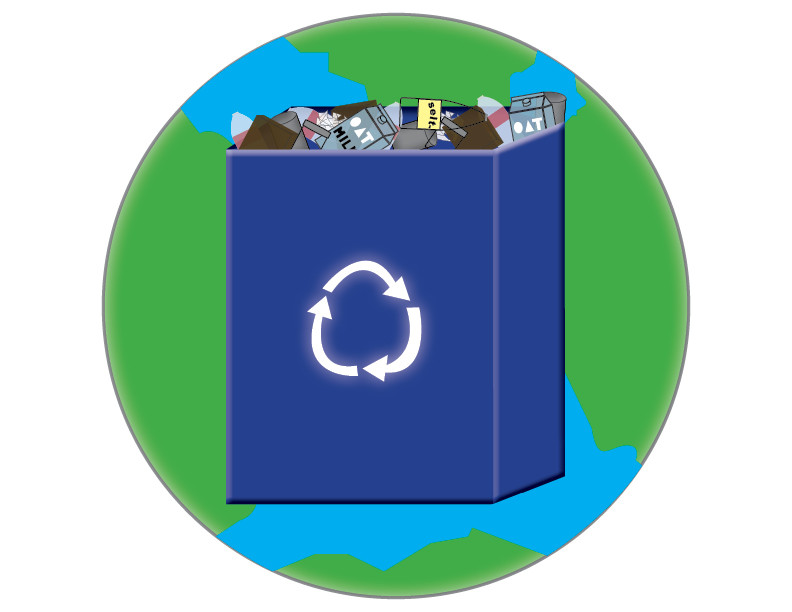In honor of Earth Day day, having been on Thursday, April 22, the three Rs of learning – reading, writing, and arithmetic – can simultaneously embody the words reduce, reuse, and recycle. As inhabitants of the planet Earth, we are responsible for keeping it clean and safe by doing these three Rs. Global carbon dioxide emissions did fall by 6.4% in 2020; but global human-caused emissions of carbon dioxide would need to fall by about 45 percent from the 2010 levels by 2030 to counter Global Warming. Hence, climate action is essential, and it can be taken everyday.
Bottles for Better’s student run recycling system
Abigail Cushman, Centerfold/Special Projects Editor
@abigailccourant
In January of 2020, the Courant published a story stating that recycling at the high school has increased 38% since 2015. Now, the Bottles for Better Club, led by senior Madison Grenauer, plans to further increase the school’s recycling productivity.
Madison and senior Imogen Smith initially proposed this bottle recycling system to Principal William Egan and Administrative Assistant Mary Cognetta in early 2020. The idea was put on hold due to the pandemic, but was resumed in January 2021 when the transition to full in-person learning began. Through this recycling system, members of the Bottles for Better Club would be responsible for collecting, cleaning, and then processing recycled water bottles at local recycling stations. “The money collected [from the recycling stations]would be donated to a charity of their choosing,” Ms. Cognetta said.
Madison and Imogen initially proposed using a roughly 1.5 x 2 foot rectangular bin in or by the door of each classroom, with the Bottles for Better logo imprinted on the bins. Teachers and students in their last period classroom would put the contents of the smaller bins into a larger bin in their hallway. However, Madison later spoke with custodians who “suggested using the existing bottle recycling bins that are located in the cafeteria, front entrance, and gym area,” Ms. Cognetta said. “The plan is to see how well-received the program and the participation are before purchasing additional recycling bins.”
While the school’s current recycling system is based on district recycling policy: recycling plastic bottles, glass bottles, paper, aluminum cans, clean aluminum foil, cardboard, clean glass jars, plastic containers, magazines, newspapers, and shredded paper, Bottles for Better will recycle plastic bottles and aluminum cans exclusively. According to Building Manager David Reyes, Bottles for Better’s recycling plan should have minimal interference with pre-existing school recycling because the cafeteria bins already recycle plastic and glass bottles alone.
One challenge to the school’s recycling system is food disposal. “Food will be thrown in the recycling bins,” Mr. Reyes said. “Once the material is stained with food or grease it can’t be recycled. It then all becomes garbage. Being mindful of putting garbage in its rightful place would be extremely helpful with this issue.” Bottles for Better hopes to avoid this hindrance being that it will recycle bottles – non food containing items.
The first Bottles for Better meeting shortly followed April break, but the club has not yet gone into full recycling action and eagerly encourages students to join. “We will make sure that we recruit honest and dedicated students who we personally know will make sure they commit to this club,” Madison and Imogen wrote in the initial Bottles for Better proposal. “We are thinking that maybe we could have a partnership with the National Honors Society (NHS) so that we could give NHS students the ability to finish service hours with this process as well.”
The Bottles for Better objective is to help protect the Earth and provide an alternative method to recycling water bottles, while also involving the school community and giving back to the larger community. “Cafeteria recycling is an essential part of school recycling; and reinforcing classroom recycling practices helps to build positive and sustainable habits,” Mr. Reyes said. “The Bottles for Better program will be making a positive difference in our community with the donation it will bring, and a positive difference in the environment.”
StuCo promotes environmental awareness by way of April Earth Week
Olivia West, Editor-in-Chief
@olivia-west
Every year on April 22, Earth Day is celebrated to mark the anniversary of the modern environmental movement and demonstrate support for environmental protection. This day of awareness is more important now than ever before, as the window of opportunity for reversing the damage done to our planet is rapidly closing. Because of their paper and plastic consumption, as well as other waste generation, high schools and students have an obligation to take action and try to reverse their negative effect on the environment.
Student Body President Alex Kurz spoke about how, for the past couple of years, the Student Coalition had been looking to do something special for Earth Day. “Whether you’re walking through town, down the street, or even throughout the high school, there is trash everywhere because people don’t clean up after themselves and are careless,” she said. “We are hoping that, as a school community, we can put an end to these habits.”
Alex explained how StuCo members sat down and brainstormed different ways that the high school could celebrate the planet in a fun, collective manner. After a process of elimination, Alex said that they came up with their five favorite activities and decided to plan not just an Earth Day, but an entire Earth Week.
Although these celebrations of Earth Day were just for a week, Alex Kurz said that she hopes the impact will last a lot longer. “The Student Coalition believes that it is always important to take care of the Earth, not just for a day, not just for a week, but for every single day throughout every single year,” she said. “The Earth deserves a lot more than just one day of appreciation, and we figured that stretching that day out over a week would allow us to do a lot more to celebrate and spread awareness.”
Monday
On Monday, April 19, StuCo took the covers off of all of the recycling bins throughout the school, and sent a list of items that can and cannot be recycled to every member of the high school. “We hope that by taking the lids off, people were more inclined to recycle things and, in the long run, it will encourage everyone to recycle more often,” Alex said.
Tuesday
On Tuesday, April 20, all StuCo members brought their own reusable water bottles to class and encouraged the rest of the school community to do the same. “By doing this, we decreased the amount of plastic being used in the school and the amount of plastic being thrown out,” Alex said.
Wednesday
In addition to limiting plastic use, StuCo wanted to decrease how much paper the high school wastes. According to Alex, Wednesday, April 21, was a paperless day and required action from both teachers and students. “Teachers were asked to keep everything online for the day, limiting the amount of paper being printed and wasted,” she said. “Students took notes online for the majority of the day and tests were, preferably, online or pushed back.”
Thursday
Thursday, April 22, is Earth Day and Alex’s favorite day of the week. Thursday was the custodian appreciation day, and every StuCo member was assigned a custodian to write a letter to thank them for all that they do. “We all walk around school and talk to familiar teachers, but we never get the chance to build relationships with our custodians,” Alex said. “They really do so much for our school, especially during times like the one we are in now.”
StuCo also cleaned up the cafeteria in shifts to help out the custodians. In doing this, StuCo hoped to inspire students eating in the cafeteria to clean up after themselves and others as well.
Friday
On Friday, April 23, the members of StuCo raised awareness for taking care of the Earth. “To end the week off, everybody in the school was encouraged to wear green and blue to show both unity and pride in our school community and for our earth,” Alex said. “The goal of the week was to get people into the habit of treating the Earth properly and understand that everything that they do affects our planet.”
According to Alex Montano, Student Body Vice President, it is our duty to take steps to save our environment. “Even though the activities we have planned for Earth Week will not resolve the issue drastically, it is the smallest things that make a difference in the end,” she said.
The Student Coalition isn’t the only high school organization fighting against climate change. Neya Krishnan, President of both National Honors Society and WE Club, has partnered with Tree-Plenish, an organization dedicated to replenishing the resources that schools use up by planting trees. “After lots of research, we learned that, within just three years, our school district uses over 16 million sheets of paper,” she said. “While our goal was to sell around 275 trees, the student response has far exceeded our expectations and we’ve currently sold over 420.”
In honor of Earth Day, Neya planned a planting event on April 24. “Students picked up their trees and planted them, with permission, around New Canaan; in backyards, at New Canaan Land Trust sites, all across the town,” Neya said.
In-School eco clubs to join right now!
Anna Gryzmski, Reporter
@anna-grzymski
The high school holds over sixty-one clubs, three of which are dedicated to advocating for the environment in different ways. This eco-club niche is made up of the Bottles for Better Club, Environmental Club, and Save Our Seas Club, which all encourage students to work towards bettering and protecting the planet. It is never too late to join any of these clubs, but how to pick which one to join? If not all? Here, we describe each club’s role in saving the planet.
Bottles for Better is the newest eco-club. Its goal is to “raise the school’s environmental awareness, instead of just telling more people to recycle” said senior Madison Grenauer, leader of Bottles for Better. “We are very hands on and make sure the recycling actually happens.” The club will collect and recycle bottles disposed by the student body. The bottles will then be put in reverse vending machines. “We are generating money so eventually we can then donate it to local charities to help local communities,” Madison said. The club has been delayed because of the pandemic so sign up quickly to attend the club’s first meeting! To join email madison.grenauer@ncps-k12.org.
The Environmental Club also started this year and is run by junior Grace Flatow and senior Augie Kelliher. The club’s main focus is to “educate and make people aware of their environmental impacts and to create change throughout the community by doing projects like plastic free day and trash clean ups” Grace said. The club recently organized a school wide plastic free day which was aimed to “make students aware of how much plastic they really use”, she said. The club meets weekly so email grace.flatow@ncps-k12.org or august.kelliher@ncps-k12.org to join. Also be sure to follow their Instagram, @nchsenvclub.
The Save our Seas Club, run by juniors Emma Cody and Katie Cota, is aimed to “make more people aware of the environmental issues going on in today’s world and do our best to take part in helping our environment,” Emma said. “More specifically, what we can do to help our seas and the areas around us such as the Long Island sound.” The club has not done a lot of fundraisers recently due to COVID-19, but hopes to start them up again soon. If you want to join, email emma.cody@ncps-k12.org or ana.cota@ncps-k12.org so you can be added to the Facebook and email list!
Earth damaging aspects of student life and how to avoid them
Abbie Dymond, Reporter
@abbie-dymond
Shein, and composting, and Dunkin’ oh my! Many students are unaware of the trails that purchasing certain brands, recycling a Dunkin’ cup, or throwing away food leave on the planet. Addressing these three mistakes is a simple way to reduce the amount of garbage we produce. The low price of the newest, trendiest clothing item has a far larger cost on the planet.
The idea of purchasing trendy clothing for cheap is very popular, especially among teenagers. In a Courant Instagram survey Conducted from a survey, it was uncovered that 80% of the student body purchases from fast fashion brands such as Shein, Urban Outfitters, and Zara. However, there is an ugly truth hiding behind these seemingly harmless clothing items.
Fast fashion is a business based on replicating and mass producing the newest trends and high-fashion designs at low cost. Science teacher Clare McLellan said that many students “are not aware that fast fashion has such an impact; but because producing the clothes creates climate issues with the carbon dioxide and other greenhouse gases, awareness of the impact is critical.” The fast fashion industry accounts for 10% of carbon emissions, so becoming aware of personal purchasing habits is an effective step in making your lifestyle more eco-conscious.
Not only is the effect of purchasing from fast-fashion companies harmful, but the quality of the clothing is poor too. According to fashion and merchandising design teacher Kelly Zilly, fast fashion companies are not using the best quality fabrics, the best cuts, or the best sewing to make clothes. “You have fabric that unfortunately wears and tears a lot faster: the stitch quality is not good, and the thread count is not as high.” Ms. Zilly said.
Brands like Afends, Frankie, Spell, and Re/Done offer relatively affordable, similar styles to Urban Outfitters, Shein, and Zara, without the same environmental impacts. In fact, Re/Done uses a technique called upcycling, where recycled materials from old clothing become new fashion items. You can upcycle your clothing by “taking pieces that you have had around for a long time, that are high quality but maybe not quite exactly that style that you love, and just doing some alterations to it,” Ms. Zilly said.
For those who might not purchase fast fashion, but would still like to live a greener life, composting utilizes and lessens food waste, helping the Earth in a similar way. Through the normal trash disposal system, food waste is burned, which requires energy. The more energy used, the more greenhouse gases emitted into the atmosphere, therefore hastening the rate at which our planet warms.
Composting, alternatively, turns food waste into soil. Known for her work at addressing sustainability, Robin Bates-Mason of Planet New Canaan said that composting “is very easy. You can put any organic material in your compost.” Compost can be picked up by a service, such as Curbside Compost, or used at home to fertilize plants. The bacteria, along with insects, worms, and fungi in compost help support healthy plant growth.
Another aspect of life to consider when limiting your waste production is container waste. After school ends, one can almost always spot some students at Dunkin’ Donuts or Starbucks. Oftentimes, the whole drink might simply be thrown in the recycling bin. “Let’s say you go to Starbucks and get a drink; the straw cannot be recycled, but neither can the plastic top, even though it has a recycling symbol on it; but the cup can be,” Ms. Bates-Mason said. “If you go get an iced tea from somewhere, take off the top and the straw, put them in the garbage, and put the cup in the recycling bin.”
According to the BBC, 30% of all food is wasted, which accumulates to about 1.8 billion tons of waste. If food waste was ended, 8% of global emissions could be eliminated. By not purchasing from fast fashion companies, composting organic materials, recycling your coffee cup correctly, and encouraging others to do the same, one can make noticeable changes in their daily lifestyle and overall community, helping to create a cleaner world.




